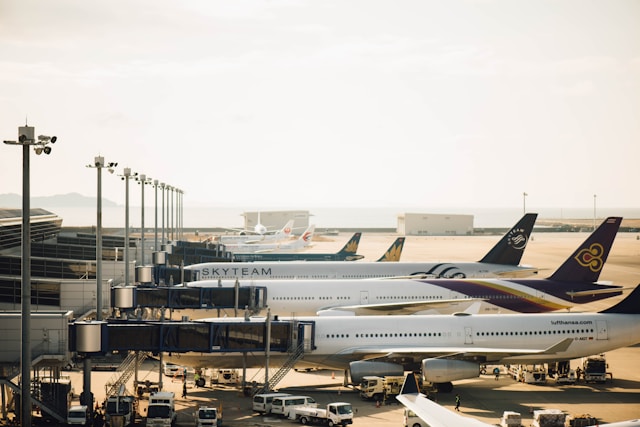- Change theme
Personalized Offers in the Sky: The Role of Data in Airline Retailing

Airline retailing refers to the modern shift in how airlines sell tickets, ancillaries, and services, not as one-size-fits-all products.
07:55 12 August 2025
Airline retailing refers to the modern shift in how airlines sell tickets, ancillaries, and services, not as one-size-fits-all products, but as curated offers tailored to each passenger’s needs. With the rollout of IATA’s New Distribution Capability (NDC) and offer-and-order frameworks, airlines are moving toward a retail model that enables highly dynamic content and personalized shopping experiences. As of 2024, more than 70 airlines are certified to use NDC to offer customized pricing, bundles, and services.
Personalization in airline retailing is transforming the passenger experience. At the APEX TECH 2025 event, industry leaders discussed how real-time passenger data is driving inflight loyalty and seamless integration, with offers that adapt to context and behavior. Meanwhile, ancillary services—such as seat upgrades, extra baggage, or Wi-Fi—now represent between 20 % and 50 % of airline revenue, and airlines are using data-driven insights via ancillary cookies to personalize those offers and increase conversions.
This shift from generic offers to precise, data-driven targeting is redefining what passengers expect. Airlines are now building meaningful journeys—where every interaction, from shopping to checkout, is personalized and smooth, setting a new standard for the future of travel.
The Data Behind Airline Personalization
Airline personalization begins with understanding the passenger. To do this, airlines gather a variety of customer data points that help them deliver tailored offers and services. Common sources include booking history, which reveals travel frequency and preferred routes; loyalty program records that track tier status and redemption patterns; seat preferences from past flights; ancillary purchases such as baggage, in-flight Wi-Fi, or meal upgrades; and even onboard behavior, like entertainment choices or purchase patterns during a journey.
The real value comes from combining real-time and historical data to create a comprehensive passenger profile. Historical data provides long-term patterns and preferences, while real-time information—such as current location, trip purpose, or weather disruptions—allows for dynamic adjustments to offers. For example, a passenger who frequently books premium economy and has a history of purchasing Wi-Fi may receive a targeted upgrade offer with bundled connectivity during the booking process or even while boarding.
With this level of personalization comes responsibility. Airlines must comply with privacy regulations such as the General Data Protection Regulation (GDPR) in the EU and the California Consumer Privacy Act (CCPA) in the US. Secure data handling, encryption, and clear consent processes are essential to building trust. Passengers are increasingly aware of how their data is used, and airlines that maintain transparency and strong data protection measures are more likely to earn loyalty while delivering the benefits of personalized travel experiences.
Targeted Offers Before the Flight
Personalization in airline retailing often begins well before passengers arrive at the airport. Using customer profiles built from booking history, loyalty data, and past purchase behavior, airlines deliver tailored pre-departure offers through email campaigns, mobile app notifications, and loyalty member portals. This early engagement not only enhances the passenger experience but also boosts ancillary revenue by presenting the right offer at the right time.
Typical pre-departure offers include seat upgrades to premium economy or business class, discounted lounge access, baggage allowance deals, and the option to pre-order special meals. For frequent flyers, offers may also extend to partner services such as hotel stays, airport transfers, or exclusive retail promotions. These are often time-sensitive, creating a sense of relevance and urgency that encourages conversion.
Predictive analytics plays a central role in making these offers effective. By analyzing historical purchase patterns alongside real-time context—such as trip purpose, travel season, and booking lead time—airlines can determine what a passenger is most likely to buy. For example, a traveler who has booked a long-haul flight in economy and has previously purchased Wi-Fi may receive a bundled offer for a seat upgrade and connectivity, delivered a week before departure when purchase likelihood is highest.
Dynamic Retailing During the Flight
Personalization does not stop once passengers are on board. Modern in-flight systems can access passenger profiles and real-time data to deliver offers that match individual needs and preferences during the journey. By combining historical information—such as past purchases and seat preferences—with current context like flight duration or connectivity status, airlines can present relevant offers directly through seatback screens, personal devices, or crew devices.
Common in-flight personalized offers include discounted Wi-Fi packages for passengers who frequently stay connected, special meal upgrades for travelers who have previously ordered premium dining, and targeted duty-free promotions based on shopping history or destination relevance. For example, a passenger flying to a popular tourist destination might be shown a limited-time discount on local specialty products available in the onboard shop.
Digital product development company COAX have a deep expertise in custom travel software development that supports this type of real-time personalization. By creating platforms that integrate passenger data, predictive analytics, and in-flight sales systems, COAX enables airlines to offer dynamic, data-driven retailing experiences. This approach helps carriers increase ancillary revenue while making the onboard journey more engaging and relevant for every traveler.
Turning Data into Passenger Delight
Data-driven personalization is reshaping airline retailing into a more responsive and passenger-focused experience. By understanding traveler preferences through booking history, loyalty data, and real-time behavior, airlines can deliver tailored offers that feel relevant and valuable at every stage of the journey. This approach not only enhances the passenger experience but also opens new opportunities for ancillary revenue and fosters stronger customer loyalty.
With the right software and strategic approach, personalization becomes far more than a passing industry trend. It evolves into a core competitive advantage, allowing airlines to stand out in a crowded market by offering experiences that are as unique as their passengers. The combination of advanced analytics, secure data handling, and seamless digital platforms makes it possible to transform every interaction—from booking to landing—into a moment of passenger delight.
